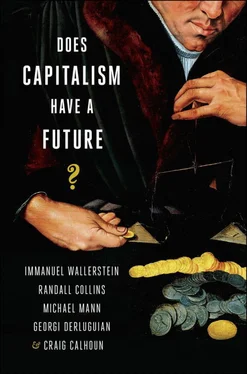In sum, the long-range future—however many centuries forward one can imagine—is likely to be a series of swings between the respective weaknesses of centralized state planning and rampant market economies. We are most certainly not looking at the emancipation of humanity, either way, but at a realistic oscillation between the horns of a socioeconomic dilemma.
I want to underline the schematic nature of my analysis. I have concentrated on a long-term structural trend in capitalist labor markets, which is at the crux of the growing inequality inside capitalism. The ongoing phase of high-tech innovation—computerization, robotization, the replacement of human communicative labor with machines—is in full swing today, and will surely become much more extreme with each passing decade. Fully advanced Artificial Intelligence does not yet exist that would closely mimic human capacities for flexible and creative cognition. The nearer AI gets to that standard, the higher the ranks of the workforce it will be able to replace. One can envision a future, perhaps less than fifty years from now, when almost all work is done by computers and robots, with a few human technicians and repair personnel. Robots are the equivalent of working-class manual labor, and factory robots have already contributed to displacing the bulk of decently paying manufacturing jobs. More advanced robots, with capacity for mobility and equipped with sensors and onboard computers, could develop into humanoid robots that would take over upper-working-class and middle-class skilled work, and then displace managers and expert professionals as well. This will not resemble the thrilling fantasies of science fiction. The real threat of the future is not some Frankensteinian revolt of the robots, but the last stage of technological displacement of labor on behalf of a tiny capitalist class of robot-owners.
Whatever the details of the technologized future turn out to be, the structural trend—the technological displacement of labor—pushes toward capitalist crisis, over and above whatever short-term, cyclical or contingent crises occur. This tendency toward increasing inequality also will undercut consumer markets, and thus eventually make capitalism unsustainable. Schematically the only way to solve the crisis will be to replace capitalism with a noncapitalist system, which means socialist ownership and strong central regulation and planning. How and where the transition will occur is much more historically singular and complicated than my theoretical scheme.
The bottom line remains: technological displacement of the middle class will bring the downfall of capitalism, in places where it is now dominant, before the 21st century is over. Whether these transitions will be peaceful or horrific remains to be seen.
Arrighi, Giovanni. The Long Twentieth Century . London: Verso, 1994.
Autor, David, and David Dorn. “The Growth of Low-Skill Service Jobs and the Polarization of the U.S. Labour Market.” American Economic Review 103 (2013): 1553–97. http://econ-www.mit.edu/files/1474
Brown, David K., and David B. Bills, eds. “Special Issue: New Directions in Educational Credentialism.” Research in Social Stratification and Mobility 29 (2011): 1–138.
Chaffee, John W. The Thorny Gates of Learning in Sung China . Cambridge: Cambridge University Press, 1985.
Chase-Dunn, Christopher. Global Formation. Structures of the World Economy . Oxford: Blackwell, 1989.
Cohen, Albert K. Delinquent Boys: the Culture of the Gang . New York: Free Press, 1955.
Collins, Randall. The Credential Society: An Historical Sociology of Education and Stratification . New York: Academic Press, 1979.
Collins, Randall. “Prediction in Macro–sociology: The Case of the Soviet Collapse.” American Journal of Sociology 100 (1995): 1552–93.
Collins, Randall. “Credential Inflation and the Future of Universities.” In The Future of the City of Intellect , edited by Steve Brint. Stanford. CA: Stanford University Press, 2002: 100–122.
Durkheim, Emile. The Division of Labour in Society . New York: Free Press, 1964 (originally published 1893).
Goldstone, Jack A. Revolution and Rebellion in the Early Modern World . Berkeley: University of California Press, 1991.
Halnon, Karen Bettez, and Saundra Cohen. “Muscles, Motorcycles and Tattoos: Gentrification in a New Frontier.” Journal of Consumer Culture 6 (2006): 33–56.
Milner, Murray Jr. Freaks, Geeks and Cool Kids: American Teenagers, Schools and the Culture of Consumption . New York: Routledge, 2004.
Schneider, Eric C. Vampires, Dragons and Egyptian Kings. Youth Gangs in Postwar New York . Princeton: Princeton University Press, 1999.
Schumpeter, Joseph A. The Theory of Economic Development . New York: Oxford University Press, 1911.
Schumpeter, Joseph A. Business Cycles: A Theoretical, Historical, and Statistical Analysis of the Capitalist Process . New York: McGraw-Hill, 1939.
Skocpol, Theda. States and Social Revolutions . New York: Cambridge University Press, 1979
Tilly, Charles. Popular Contention in Great Britain, 1758–1834 . Cambridge MA: Harvard University Press, 1995.
Wallerstein, Immanuel. 1974–2011. The Modern World-System . Vols. 1–4. Berkeley: University of California Press.
White, Harrison C. Markets from Networks . Princeton, NJ: Princeton University Press, 2002.
Zelizer, Viviana. The Social Meaning of Money . New York: Basic Books, 1994.
3

THE END MAY BE NIGH, BUT FOR WHOM?
Michael Mann
Historical sociologists like myself are good at predicting the past, but the future is another matter. It is especially difficult to predict the future of major social institutions like the nation-state or capitalism. It becomes easier if one believes that the institution in question is a “system” with its own internal logic of development, its own cycles, its own contradictions. Then we could identify the current logic of development and project a likely future. Many do believe this is possible in the case of capitalism. Neoclassical economists believe that capitalism involves regular business cycles with an inherent tendency to move toward equilibrium. So after the present difficulties of capitalism, there will come recovery, then another crisis followed by another recovery, all probably on an overall upward trajectory of development. Those who perceive deeper, less frequent but more threatening cycles, like Kondratieff or Schumpeter, have also seen them as having some internal regularity and (in the case of Kondratieff) predictability. Even Keynes, who regarded the concept of equilibrium with some skepticism, did not deny that in the long run it would be reestablished, though with a little help from the state. These models tend to convey the image of capitalism as eternal (though not Schumpeter). Marxists also see capitalism as having an inner logic of development, but they see it—as they see all modes of production—as possessing systemic contradictions which will eventually bring it down.
The systemic element is explicit in what is called world-systems theory, whose major theorist is Immanuel Wallerstein. The only difficult part of prediction for such Marxists and systems theorists lies in the question of what will succeed it (for many of them have lost their confidence that the future is socialist). Since most intellectuals pontificating about capitalism come from the West, and since Western capitalism is obviously experiencing contemporary difficulties, doom scenarios for capitalism are currently increasing in popularity.
Читать дальше













